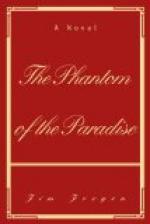|
This section contains 1,045 words (approx. 4 pages at 300 words per page) |

|
Brian De Palma, the writer-director of "Phantom of the Paradise," thrives on frowzy visual hyperbole. When he tries to set up a simple scene establishing that boy composer loves girl singer, he is a helpless amateur, but when he sets up a highly stylized paranoid fantasy with gyrating figures on a stage and an audience that is having its limbs hacked off, you can practically hear him cackling with happiness, and the scene carries a jolt. De Palma, who can't tell a plain story, does something that a couple of generations of student and underground filmmakers have been trying to do and nobody else has ever brought off. He creates a new Guignol, in a modern idiom, out of the movie Guignol of the past…. [A] mixture of "The Phantom of the Opera" and "Faust" (via "The Devil and Daniel Webster") isn't enough for De Palma. He heaps...
|
This section contains 1,045 words (approx. 4 pages at 300 words per page) |

|


